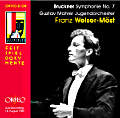ORFEO International – Reviews
Important Releases Briefly Introduced
September 2012
Salzburger Festspieldokumente 2012
However spectacular the Salzburg Festival may be, 
C 844 121 Band however indebted to international stars, it is also remarkable for the sense of continuity it has shown over the years. This is a fact tinged with melancholy when one considers the half-century in which Dietrich Fischer-Dieskau played a determining role at the Festival as singer, reciter and as conductor. His last concert in Salzburg, in which he conducted the Mozarteum Orchestra, is now available in the CD series Festival Documents. In a concert devoted entirely to Mozart, the pianist Konstantin Lifschitz was not just a soloist but a real partner in dialogue in the Piano Concerto K 456. The concert begins in solemn fashion with the Adagio and Fugue K 546 and ends in elation with the “Italian” Symphony K 202.
The pianist Alexis Weissenberg 
C 869 122 Balso died in 2012. He made his breakthrough in Salzburg during the Karajan era and is now represented in the Festival Documents with his solo recital of 1972. His evening began with Ravel's Tombeau de Couperin, played transparently and with a highly flexible touch. Even the technically trickiest passages of Schumann's C-major Fantasy were embedded organically and convincingly into the musical flow of the work. Mussorgsky's Pictures at an Exhibition could hardly be played more effectively or with more colour than in Weissenberg's interpretation. This work ended the “official” part of his recital, though there followed many surprising encores, which can all be heard on these two CDs (for the price of one) and thus round off this memento of the artist.
Of the artists active today, 
C 867 121 BRicardo Muti has already been a welcome guest at the Festival for more than forty years. His first conducting engagements there did not just provide the basis for his current “telepathic” relationship with the Vienna Philharmonic, but also brought collaborations with important soloists of the older generation. Thus the new CD in the series Festival Documents includes the Piano Concerto by Robert Schumann under Muti's baton, with Sviatoslav Richter once more proving the uniqueness of his pianistic gifts. Over and above all its virtuoso challenges, Richter and Muti together give an account of the work triumphant in its formal cohesion and in which they sculpt it as a large-scale musical arch. Muti's deep understanding of Rossini and Mozart ? represented here by the Overture to Semiramide and the Sinfonia Concertante K 364 respectively ? is also clearly evident in these early recordings.
We can draw similar conclusions about 
C 868 121 BFranz Welser-Möst, whose first Bruckner performance at the Salzburg Festival was justly celebrated in 1989. He conducted the Gustav Mahler Youth Orchestra in the Seventh Symphony, in an interpretation by these young performers that was astonishing in its transcendence and in its manner of outlining the work's musical contrasts. It was no surprise that the press greeted the conductor and the orchestra as a sensation and as a great hope for the future ? it was also, after all, the first Festival “after” Karajan. Those hopes were later confirmed, and Welser-Möst and the Gustav Mahler Youth Orchestra have since then returned to Salzburg on a regular basis.
Although no longer a regular guest, 
C 871 121 BJosé Carreras was in the 1970s and '80s one of the great, up-and-coming singers and he returns in 2012 once more for a song recital in Salzburg. Accompanied here by Edoardo Müller, his recital of 1981 takes us from the French song with piano by Massenet and Fauré via the tenor “classics” of Tosti to the canciones of De Falla, Mompou and Turina ? and all sung with a secure sense of style and with great subtlety. Carreras's encores delighted adherents of the brilliant tenor repertoire, and can be appreciated on this recording too.
Another favourite of the Salzburg public was the mezzo-soprano 
C 870 121 BFrederica von Stade, who besides her Cherubino in Mozart's Marriage of Figaro also enjoyed repeated successes in Salzburg with her song recitals. In 1986, accompanied by Martin Katz, she offered a programme that knew no boundaries ? ranging from the florid poesy of settings by Fauré and Strauss to Mahler's Songs of a Wayfarer, the moderate American Modernism of Charles Ives, Copland and Pasatieri, then to Canteloube's French folk song adaptations. Schoenberg's early cabaret songs served to round off the evening in ebullient fashion.
In 2008, 
C 840 121 BCarolin Widmann, Jörg Widmann, Nicolas Altstaedt and Alexander Lonquich performed Olivier Messiaen's Quartet for the end of time for violin, clarinet, cello and piano with the seriousness of spirit and subtle understatement that the work requires. Composed in 1940 in a German prisoner-of-war camp, Messiaen here reached a pinnacle of his composing career at the age of just 31. In this work he conveys to his listeners his spiritual interpretation of (musical) time and plays of colour. With these four exceptional chamber musicians, all masters of their art, the Salzburg Festival was treated to an exemplary performance of this work.
top |